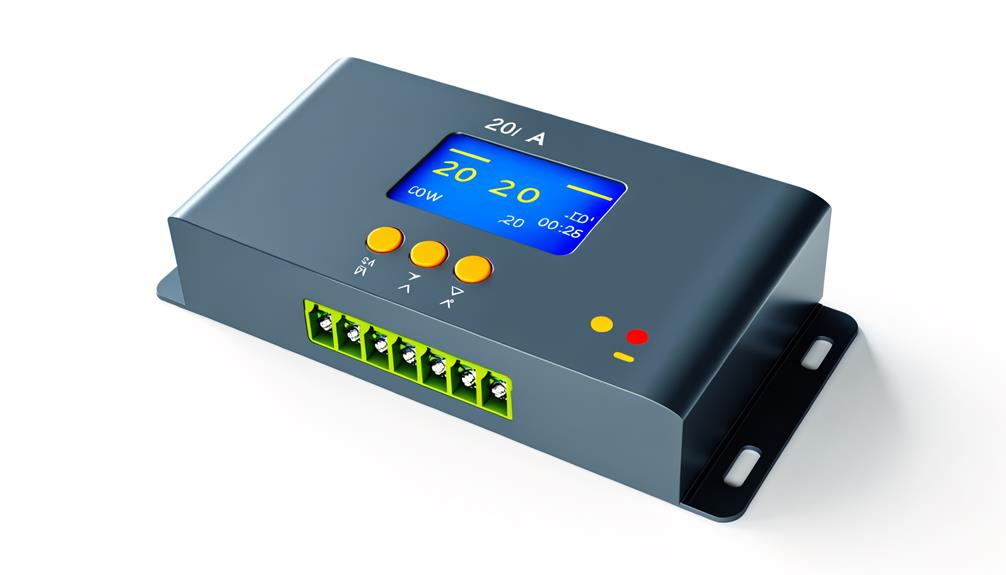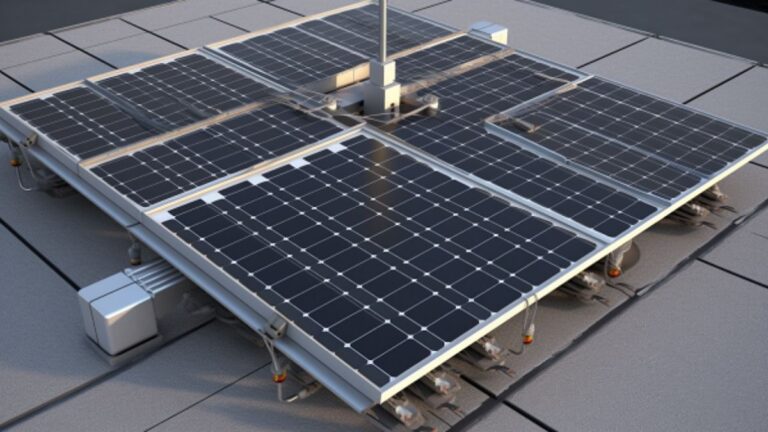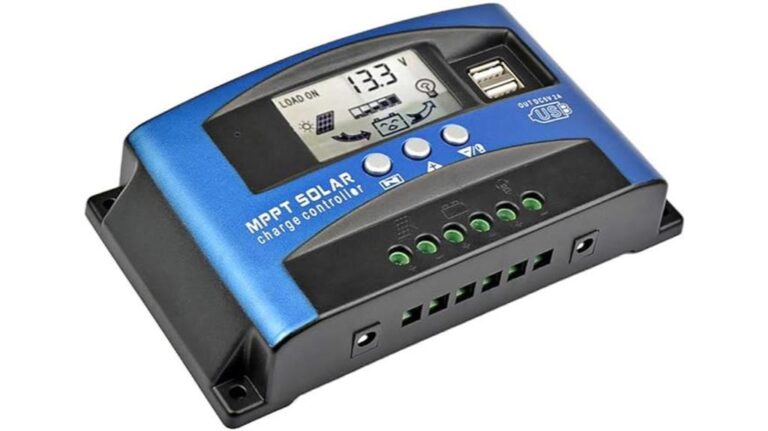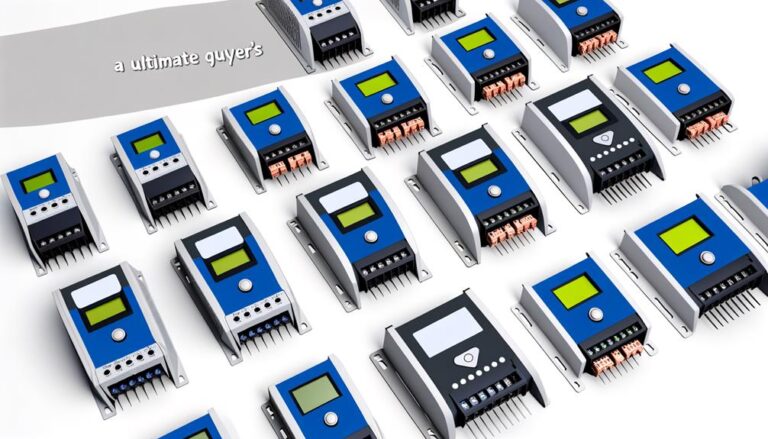Best 20A Solar Charge Controller: Buyer's Guide
Are you in the market for a 20A solar charge controller?
Well, did you know that a good quality charge controller can increase the efficiency of your solar system by up to 30%?
That’s right, choosing the right controller is crucial if you want to maximize the power output of your solar panels and protect your batteries from overcharging or discharging.
But with so many options available, how do you know which one is the best for you?
In this buyer’s guide, we will explore the top features to look for, discuss the best controllers for beginners and advanced users, and provide you with all the information you need to make an informed decision.
So, let’s get started and find the perfect 20A solar charge controller for your needs!
Key Takeaways
- PWM controllers are a more affordable option suitable for small DIY solar systems.
- MPPT controllers are more expensive but can achieve up to 20% higher efficiency.
- Factors to consider when choosing a solar charge controller include system size, panel output, temperature conditions, efficiency, and compatibility with batteries.
- Important features to look for in a solar charge controller include temperature compensation, digital display, load control output, protection features, and communication ports.
Types of 20A Solar Charge Controllers
There are two main types of 20A solar charge controllers: PWM and MPPT.
A solar charge controller is an essential component of any solar energy system, responsible for regulating the flow of energy between the solar panels and the battery.
PWM controllers, short for Pulse Width Modulation, are the standard and less expensive option. They’re suitable for small DIY solar systems and have a straightforward design.
On the other hand, MPPT controllers, or Maximum Power Point Tracking, are more expensive and complex. They’re capable of pairing non-matching input voltages, making them more versatile. MPPT controllers can reach up to 20% higher efficiency due to their four-stage charging method.
When selecting a solar charge controller, consider factors such as system size, solar panel output, and temperature variations.
Factors to Consider When Choosing a 20A Solar Charge Controller
When selecting a 20A solar charge controller, several important factors must be considered to ensure optimal performance and compatibility with your solar system.
First, you need to evaluate the size of your solar system and the output of your solar panels. This will help determine if the charge controller can handle the load.
Next, consider the temperature conditions in which your system operates. In colder temperatures, an MPPT controller may be more efficient, while in warmer climates, an MPPT controller may not be necessary.
Additionally, compare the efficiency and cost differences between MPPT and PWM controllers to determine the best fit for your needs and budget.
It’s also essential to ensure that the charge controller is compatible with the voltage and type of batteries used in your system for optimal performance.
Lastly, look for additional features such as temperature sensors, LCD displays, and load control outputs to enhance the functionality of the charge controller in your solar power system.
Top Features to Look for in a 20A Solar Charge Controller
Consider the following top features when searching for a 20A solar charge controller to ensure optimal performance and functionality for your solar power system.
First, look for a controller with temperature compensation, which adjusts the charging voltage based on temperature to maximize battery life and performance in varying climates.
Secondly, opt for a controller with a digital display, allowing for easy monitoring of system status and performance.
Additionally, choose a controller with load control output to directly power DC loads, maximizing energy usage.
It’s also important to select a controller with multiple protection features such as overcharge and over-discharge protection to ensure the safety of your battery bank.
Lastly, consider a controller with communication ports for remote monitoring and control, enhancing the management of your solar system.
Best 20A Solar Charge Controllers for Beginners
For beginners looking to delve into solar power systems, selecting the best 20A solar charge controller is crucial for efficient battery charging and optimal system performance. When it comes to choosing a solar charge controller, there are two main types to consider: PWM and MPPT charge controllers.
Here are some key factors to keep in mind as a beginner:
PWM Charge Controllers:
- Cost-effective and reliable for small-scale systems.
- Suitable for low power needs and budget-friendly setups.
MPPT Charge Controllers:
- More efficient and complex than PWM controllers.
- Ideal for systems with higher voltage solar panels, watt panels in parallel or series, and temperature variations.
Best 20A Solar Charge Controllers for Advanced Users
Now that you have familiarized yourself with the basics of solar charge controllers, it’s time to explore the top choices for advanced users in the 20A solar charge controller category.
Advanced users require controllers that can handle higher levels of power and provide more precise control over battery charging.
One of the best options for advanced users is the MPPT (Maximum Power Point Tracking) controller. MPPT controllers use advanced algorithms to maximize the power output of solar panels by adjusting the input voltage and current flowing into the batteries.
They can also handle a wider range of battery types and have the ability to boost the voltage increases for more efficient charging.
Some top choices for 20A MPPT controllers include the Renogy Wanderer, BougeRV PWM Charge Controller, and Victron Energy BlueSolar PWM.
These controllers offer advanced features and capabilities, making them ideal for users who want more control and efficiency in their solar charging systems.
Related Post: Efficiency and Safety: Unveiling the Best Solar Charge Controller.
Frequently Asked Questions
How Many Solar Panels Can a 20 Amp Controller Handle?
A 20 amp solar charge controller can handle multiple solar panels, but the total wattage should not exceed its capacity. Consider the voltage of the panels and consult the manufacturer or a professional for guidance if unsure.
How Do I Know What Solar Charge Controller to Buy?
To know what solar charge controller to buy, consider your budget, battery compatibility, installation ease, durability, and warranty. Compare MPPT and PWM technology for energy efficiency. Look for overcharging protection and remote monitoring options for liberation.
Which Solar Charge Controller Is Best?
The best solar charge controller depends on your specific needs, but top rated controllers offer key features like MPPT technology, multiple charging modes, and proper sizing for optimal performance. Consider brands like Renogy, BougeRV, and Victron Energy for reliable options.
How Do I Choose the Right Size Solar Charge Controller?
To choose the right size solar charge controller, consider load capacity, system voltage compatibility, efficiency and performance, temperature and environmental factors, battery type and capacity, overload and short circuit protection, monitoring and control features, brand reputation, and customer reviews. Also, make sure it fits your budget.
Conclusion
After carefully considering the factors and features, you’ve finally found the best 20A solar charge controller for your needs. With its efficient performance, load control capabilities, and protection features, this controller ensures optimal charging and battery management.
Its built-in display provides real-time monitoring, giving you peace of mind. Trust in the reputation of the brand and the positive customer reviews, knowing that you’ve made a reliable and high-quality choice.
Now, with your solar system fully equipped, get ready to harness the power of the sun for a brighter future.






